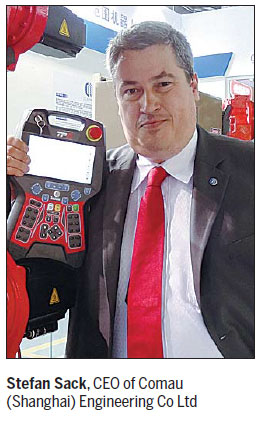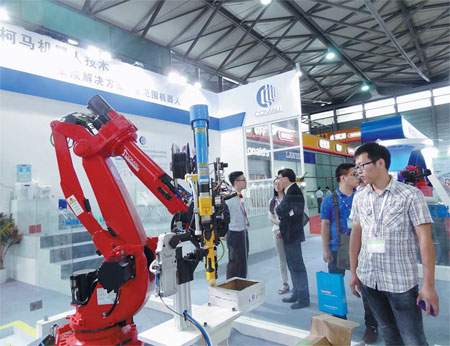No more games: Robots get serious in China
Updated: 2014-08-01 09:57
By Chen Yingqun (China Daily Europe)
|
|||||||||||
|
A Comau robot on show at the recent China International Robot Show in Shanghai. Photos by Chen Yingqun / China Daily |

The race is on to apply robotics to everything from making shoes to preparing food
Many visitors at the recent China International Robot Show in Shanghai were captivated by the machines that could pour water, pick up candy or play chess.
But Stefan Sack was looking at something else entirely.
"See this robot? It shakes when it stops moving," he says, pointing out a sign of poor quality.
"This one has a sensor. If you stand here, it would stop. But if it is not sensitive enough and doesn't stop, it will hurt people," Sack says, pointing out the possible consequences of a robot not being up to snuff.
Sack was standing inside a booth in an area where Chinese companies were located at the show. As CEO of Comau (Shanghai) Engineering Co Ltd, he is keen on learning the latest innovations and trends in the Chinese robot market.
There is a good reason for that. Sack's company, a branch of Comau Group of Italy, which is a subsidiary of Italy-based Fiat Group Automobiles, is moving its robot production from Italy to China this year.
"We have a series of projects moving production capabilities from Italy to China because we want to be close to customers," Sack says. "The growth in China is much bigger than the growth in other countries."
Within five years, the majority of its robot production will be transferred from Turin, Italy, to a plant in Kunshan, Jiangsu province, about an hour's drive from Shanghai.
"We will expand the current plant and set up local R&D support. The investment is 2-3 million euros ($2.7 million-$4 million) to start with, and we will continue with similar numbers each year," he says.
China, with sales of about 37,000 industrial robots last year, has surpassed Japan to became the world's biggest buyer for the first time. It is also the fastest-growing market worldwide, with total supply of industrial robots increasing by an average of 36 percent annually for the past five years, says Li Xiaojia of the China Robot Industry Alliance's statistics department.
In the next 10 years, China's annual growth in robots is forecast to be about 40 percent per year, industry officials say.
Though Comau has more than 30 years of experience in making and applying robots, it did not tap into the Chinese market until 2010, Sack says.
The company has been making and selling advanced manufacturing systems worldwide for about 40 years. It offers customized services and support at 24 locations in 13 countries.
It came to China in 1997 and set up Comau (Shanghai) Engineering in 2001 to enter the automotive industries with its engineering and systems business. In 2011, it set up another company in Kunshan, and it has a branch in Dalian and two sales offices in Shenzhen and Chongqing.
But it was not until two things happened in the past few years - rising labor costs and China's stated desire to move its manufacturing to the next level - that the robotics industry took off, Sack says.
The company took the plunge, setting up Kekun (Kunshan) Automation, a manufacturing company mainly dedicated to robotics, to serve Comau's markets in China and around the globe. The factory, of some 20,000 square meters, can produce 9,000 robots a year.
Sack says only about 10 percent of Comau's current business in China is robotics, but its growth is much quicker than that of other sectors. Last year, its robotics sales exceeded 100 million yuan ($16 million, 12 million euros).
"The biggest advantage of China is that Chinese are very keen on technological innovation, much keener than Europeans, so they are more willing to try something new," he says. "Last year basically we tripled our sales, and we think a 30 to 40 percent growth rate is realistic every year."
Wang Guochao, general manager of Comau (Shanghai) Engineering, says more than 70 percent of the robots Comau has sold have been used in the automobile industry. The company has been working mainly on producing robots for car companies such as SAIC, Geely, GAC FIAT, Chery and FAW.
However, there is increasing potential for robotics in general industries, which are speeding up automation, so Comau has begun to put more emphasis on machines for applications such as food production and electronics manufacturing. The company has already been asked by some small and medium-sized companies to make robots to their specific needs.
"We expect to produce equal numbers of robots for the automobile industry and general industries in the near future," he says.
"China is moving up in terms of sophistication in manufacturing, and some industries for the first time are being automated," Sack says.
"We have talked about providing robots to industries such as shoe making, which has been a very manual process, so we are in a very different stage."
Sack says the company will design new robot models for China, especially for general industries, "since we see the biggest additional potential there".
The three robots Comau exhibited at the Shanghai show are mainly for general industries, and perform tasks such as handling, assembly, loading and unloading, welding and gluing. While maintaining an emphasis on speed and efficiency, these robots are designed to look less cold and intimidating as the company tries out some new designs, Wang says.
For example, the Racer 7-1.4, introduced in May and the first Comau robot made solely in China, has a racing design in red, similar to the looks of the Ferrari race cars that Comau's sister company makes.
"When people think about robots, they focus on its function," Wang says. "But steel structures look cold and boring in the factory, which might make workers uncomfortable, so we decided to try to make the robots look more friendly and more pleasing to the eyes."
Sack says the company is also looking at reducing the complexity of operating their robots.
"Dealing with a robot is just like driving a car. If you want to drive a car to get somewhere, you need to know where to go. But if you have confusing directions, you are doing nothing but driving around," he says. "So it is with a robot. You need to know the destination you hope to reach using the robot, and then we need to make it so easy that people without much of a technical background can use it. At the moment, it is too complex."
Almost all robot brands are interested now in the China market, and more local robot makers are going into this business. When Sack was attending the CEO roundtable of the International Association of Robotics and China Robot Industry Alliance, the business cards he got were mostly from government officials from all over the country, he says.
But he says while Comau welcomes fair competition, he is more concerned about heated and uncoordinated investment in the industry that might cause cutthroat competition that drastically cuts prices and compromises quality.
"We are seeing that new companies coming in are not mature, of course, and are looking for a way to survive. If they don't have a proven brand, or they don't have the technology, there is only one way to compete, and that is on price."
Sack says another problem bedeviling robotics in China is that quick growth in general industries requires the development of many different application programs to adapt the machines to a wide variety of tasks. The hitch is an inadequate number of qualified people, including low numbers of integrators, or those who design the application programs for the robots, who are needed much more than a large number of manufacturers.
"Education basically must happen everywhere, because you need people with robot capabilities everywhere, not only where we manufacture robots but also where robots are used, which will be everywhere in China. The need is greatest at locations where the robot integration is being done."
Sack says Comau is looking to find or develop more qualified integrators, and they have started working with universities to educate people in the field, aiming to build strong partnerships with integrators.
Believing that research and development will always be the key to success, Comau has about 1,000 employees in China, of which 600 are engineers.
Among its new products being made in China are robots that can lift 110 kilograms or 220 kilograms and palletizing robots that can load and unload parts, boxes or other items to or from pallets. They will design more models for the Chinese market next year.
Sack says when people talk about the robotics industry, they divide it into foreign companies and Chinese ones. He says he wishes the boundary was not drawn so sharply. As long as Comau Shanghai is in China and creates jobs in China, he would like it to be considered a Chinese company and share in government R&D funding.
"We should have access to R&D funding in China for the Chinese branches," he says.
chenyingqun@chinadaily.com.cn
(China Daily European Weekly 08/01/2014 page10)
Today's Top News
London hottest property for Chinese investors
Liberia shuts schools over Ebola
China's men no match for women?
Thai junta sets plan for fast rail links to China
Carnage at UN school as Israel pounds Gaza Strip
Abbas declares Gaza 'disaster area'
US House approves lawsuit against Obama
3 people killed, deputies wounded in NC shootout
Hot Topics
Lunar probe , China growth forecasts, Emission rules get tougher, China seen through 'colored lens', International board,
Editor's Picks

|

|

|

|

|

|






